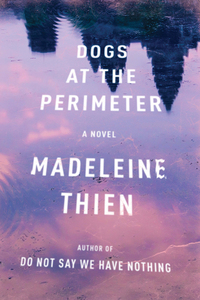Take a photo of a barcode or cover
Feels like a pseudo-blueprint for Do Not Say We Have Nothing, but that impression probably results from blitzing through this less than 48 hours after finishing the other, and it's really a disservice to both, suggesting Dogs at the Perimeter is a dress rehearsal. They explore similar themes, rendered in clear prose, but that's the extent of it. There's an uncompromising starkness to this earlier work that the more recent one lacks, making Dogs less immediately accessible, and ultimately better at conveying the conflicted reality of forging identity in the wake of personal and historical trauma.
This book is heartbreaking, but the writing is so beautiful that it carries you through. And because of that, you learn of a time that history books never told you about. And you mourn for that time and those lives gone.
“My mother once told me that when a child is born, threads are tied round the infant's wrists to bind her soul to her body. The soul is a slippery thing. A door slammed too loudly can send it running. A beautiful, shining object can catch its attention and lure it away......We did not come in solitude, my mother told me. Inside us, from the beginning, we were entrusted with many lives. From the first morning to the last, we try to carry them until the end.”
“My mother once told me that when a child is born, threads are tied round the infant's wrists to bind her soul to her body. The soul is a slippery thing. A door slammed too loudly can send it running. A beautiful, shining object can catch its attention and lure it away......We did not come in solitude, my mother told me. Inside us, from the beginning, we were entrusted with many lives. From the first morning to the last, we try to carry them until the end.”
I had read " Do Not Say We Have Nothing" and absolutely loved it! The way the characters were all linked together over decades during revolutionary times in China was really gripping and fascinating to me. I had hoped this book would be similar, it was in the same written structure with the story spanning decades but it didn't have the same wonder or spark :/
emotional
slow-paced
I read this one a few months back and apparently never got around to reviewing it, possibly because I'm not quite sure how to word it. When I picked it up the blurb intrigued me, but unfortuanatley the writing not as much. I'm not sure if it was the style or something else but I was not pulled into the story as much as I'd hoped.
emotional
medium-paced
Plot or Character Driven:
A mix
Strong character development:
Complicated
Loveable characters:
Yes
Diverse cast of characters:
Yes
Flaws of characters a main focus:
Yes
emotional
sad
fast-paced
This book feels almost untethered, which makes some sense given the kind of “grounding” in the main character’s study of brain disorders. But the stronger parts are the more straightforward (but certainly haunting) portions recounting Mei/Janie’s experiences in Cambodia, as well as those of her brother. The modern day framing seems almost unnecessary, and the ending is abrupt.
Graphic: Child death, Death, Genocide, Murder
This is a very touching book about people dealing with unspeakable pain and suffering.
I liked the literary approach it took towards a sad topic and how it hinted at the various coping mechanisms. It is not a demonstrative book but very subtle.
"Everyone had a different life before but it doesn'e mean we must all go to the same end".
I liked the literary approach it took towards a sad topic and how it hinted at the various coping mechanisms. It is not a demonstrative book but very subtle.
"Everyone had a different life before but it doesn'e mean we must all go to the same end".
A tragic and necessary account of survivors of the Khmer Rouge. Madeleine Thien is gifted in evoking the dilemmas of a survivor.
This is a look at the horrors the Cambodians lived through, and the aftermath. I preferred her book, Do Not Say We Had Nothing. The story was a bit disjointed, and I struggled with the character names that changed, and also to know the time frame of what I was reading. A few notes would have helped me on this one.
I grew to not be bothered by the style (I still failed to see the point of it, though, even when I understood how Thien tried to emulate post-trauma disjointed thoughts), but I really wished Thien gave certain characters more details. The fellow girl at the camp and James’s supervisor, for example, hold such great potentials.




